Why this resume works
- Quantifies accomplishments: By detailing specific metrics like a 25% improvement in client satisfaction, the resume clearly quantifies accomplishments and demonstrates measurable impact.
- Showcases career progression: The resume showcases career progression by illustrating a journey from support coordinator to disability support worker, highlighting increased responsibilities and growth.
- Uses action-oriented language: Action verbs such as “provided,” “improved,” and “coordinated” effectively engage the reader, emphasizing proactive contributions throughout the candidate’s work experience.
More Disability Support Worker Resume Examples
Our disability support worker resume examples provide guidance on showcasing your caregiving skills, empathy, and experience. Use these samples to create a social services resume that emphasizes your commitment to supporting individuals with disabilities.
Entry-level Disability Support Worker
Why this resume works
- Features education section: The education section is placed near the top of the resume, which is ideal for a job seeker who is early in their career and wants to show they have the credentials needed for the job.
- Touches on accomplishments: Creating a separate Accomplishments section gives the job seeker a chance to showcase specific accomplishments like a 95% increase in patient satisfaction.
- Shows digital literacy: The resume highlights computer skills in healthcare coordination and patient advocacy tools, underscoring the candidate’s readiness for a modern digital workplace.
Mid-level Disability Support Worker
Why this resume works
- Includes mix of soft and hard skills: Demonstrates a strong balance of soft and hard skills, weaving together technical proficiency in care coordination with interpersonal abilities like empathy and communication.
- Demonstrates language abilities: Illustrates language abilities by listing English, Spanish, and French proficiencies, suggesting an adeptness at cross-cultural communication essential for international project work.
- Displays technical expertise: Displays technical expertise through specialized certifications in disability support, first aid, and mental health first aid, emphasizing the importance of industry-specific knowledge.
Experienced Disability Support Worker
Why this resume works
- Lists relevant certifications: The resume lists certifications like CNA and Certified Disability Support Worker, illustrating a solid foundation of expertise and dedication to ongoing professional development.
- Showcases impressive success: Significant accomplishments such as reducing patient readmission rates by 10% underscore the candidate’s impactful contributions at a senior level in healthcare settings.
- Emphasizes leadership skills: Leadership skills are evident through initiatives like developing training programs for new staff, demonstrating capability to guide and enhance team performance.
Disability Support Worker Resume Template (Text Version)
David Garcia
Silverlake, WA 98293
(555)555-5555
David.Garcia@example.com
Professional Summary
Compassionate disability support worker with 7 years’ experience. Expertise in client care, improved satisfaction by 25%. Skilled in crisis management and support coordination, enhancing care delivery.
Work History
Disability Support Worker
Compassionate Living Services – Silverlake, WA
January 2022 – March 2025
- Provided care for 15+ clients weekly
- Improved client satisfaction by 25%
- Delivered tailored supports for individual needs
Personal Care Assistant
BrightPath Caregiving – Tacoma, WA
January 2019 – December 2021
- Assisted 20+ clients with daily living tasks
- Reduced incident rates by 15%
- Coordinated with healthcare professionals
Support Coordinator
Serenity Care Solutions – Seattle, WA
January 2017 – December 2018
- Managed schedules for 10+ clients
- Increased service delivery efficiency by 20%
- Devised personalized care plans
Languages
- English – Beginner (A1)
- Spanish – Beginner (A1)
- French – Beginner (A1)
Skills
- Client care
- Needs assessment
- Medication administration
- Support coordination
- Daily living assistance
- Emotional support
- Crisis management
- Healthcare collaboration
Certifications
- Certified Disability Support Worker – National Caregiver Association
- First Aid and CPR – Red Cross
Education
Master of Social Work Social Work
University of Illinois Champaign, Illinois
May 2016
Bachelor of Arts Psychology
Springfield College Springfield, Illinois
May 2014
Popular Skills for a Disability Support Worker Resume
A well-crafted skills section on your resume is essential for displaying the blend of technical abilities and personal qualities needed to excel as a disability support worker. This role requires both hard skills, like knowledge of care techniques, and soft skills, such as empathy and patience, to provide effective support. For more information on how to showcase these abilities, visit resume skills.
Below are a few of the top soft skills frequently listed on disability support worker resumes.
| Soft Skills | % of resumes with this skill |
|---|---|
| Emotional support | 34% |
| Client confidentiality | 31% |
| Relationship building | 28% |
| Disability awareness | 22% |
| Documentation skills | 21% |
Here are a few examples of hard skills frequently included on disability support worker resumes.
| Hard Skills | % of resumes with this skill |
|---|---|
| Personal care | 50% |
| Independent living support | 49% |
| Daily living assistance | 48% |
| Housekeeping and meal preparation | 46% |
| Health and safety | 31% |
Related Resume Guides
Advice for Writing Your Disability Support Worker Resume
Not sure how to make a resume for a disability support worker job? No worries — I’ve got you covered. I’ll show you how to highlight your compassion, experience, and the amazing work you do to support people with disabilities. With a few simple tweaks, you can create a resume that really shows your skills and the difference you make every day.
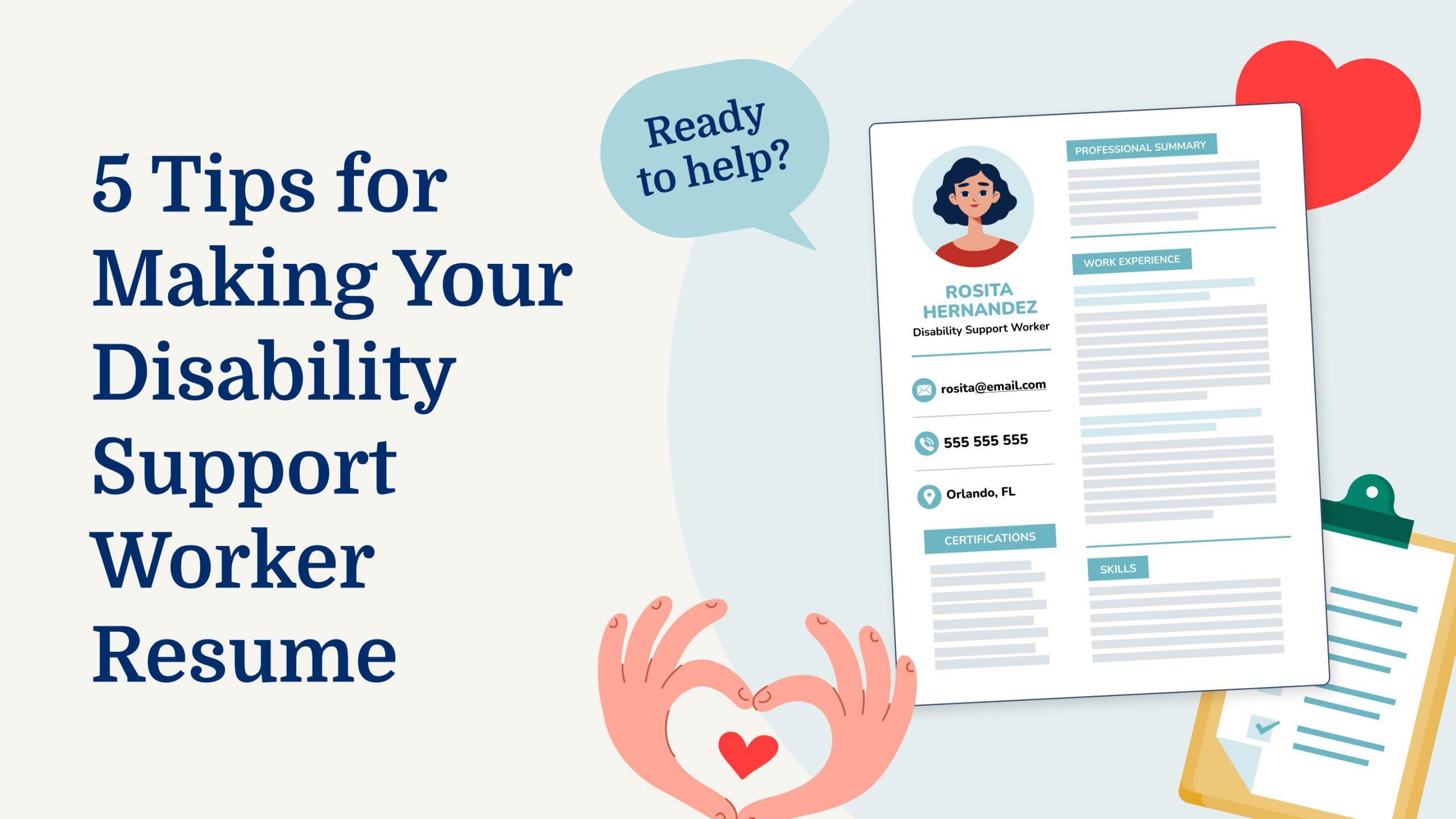
Write a strong professional summary
A professional summary offers a snapshot of your skills and experience, helping employers see why you are suited for the role of a disability support worker. For those with ample experience, a summary can show your achievements and field expertise. On the other hand, if you lack extensive work history, a resume objective is best for conveying your passion and career goals.
Strengthen your professional summary by using action verbs to highlight your accomplishments and their impact. For example, replace “helped clients” with “provided compassionate care to clients.” Showcase essential skills like communication, empathy, and problem-solving pertinent to a disability support worker. Include any relevant training or certifications as well.
Customize your summary according to the job description to demonstrate that you meet their exact needs. Keep it concise and concentrated on how you can contribute to their team’s success.
Disability support worker resume summary examples
Entry-Level
Compassionate and dedicated recent graduate with a Certificate IV in disability support. Equipped with foundational skills in personal care, communication, and fostering independence among clients. Certified in First Aid and Manual Handling, eager to contribute to improving the quality of life for individuals with disabilities through empathetic support and assistance.
Mid-Career
Experienced disability support worker with over 5 years of hands-on experience in both residential and community settings. Proficient in developing individualized care plans, providing personal care, and facilitating recreational activities. Holds a Diploma in Community Services, known for strong rapport-building skills and a commitment to enhancing client autonomy and well-being.
Experienced
Seasoned disability support worker with 10+ years of experience specializing in complex care needs, including intellectual disabilities and mental health support. Certified Trainer in Positive Behaviour Support (PBS) and Advanced First Aid. Proven track record of leading teams, implementing innovative support programs, and achieving measurable improvements in client satisfaction and independence.
Disability support worker resume objective examples
Recent Graduate
Recent graduate with a diploma in disability support services eager to begin a career as a disability support worker. Passionate about providing compassionate care and support to individuals with disabilities, utilizing strong interpersonal skills and a dedication to improving clients’ quality of life.
Career Changer
Detail-oriented professional transitioning from customer service into the field of disability support. Bringing excellent communication skills and a patient-centered approach to assist individuals with disabilities in leading fulfilling lives. Committed to ongoing learning and contributing positively to client well-being.
Specialized Training
Certified disability support worker with additional training in Mental Health First Aid looking to join an inclusive organization. Eager to use my specialized training and empathetic nature to provide comprehensive support services, enhancing the independence and daily living experiences of clients.
Create a strong resume quickly! Use our Resume Builder to highlight your skills and experience as a disability support worker.
Include relevant certifications and training
Listing certifications and training is very important for a disability support worker. It shows that you have the right skills and qualifications to help people with disabilities. These credentials prove your expertise and dedication to providing good care. Having a dedicated Certifications section on your resume makes it easy for employers to see your qualifications quickly.
Here are a handful of certifications you might want to consider for your resume:
- Certified Direct Support Professional (DSP)
- First Aid and CPR Certification
- Crisis Prevention and Intervention (CPI) Certification
- Certificate III in Individual Support (Australia)
- Medication Administration Certification
Including these details can make your resume stand out because it shows you are well-prepared for the job. This section should be placed near your education information to highlight all your relevant qualifications together.
Example of a certifications section
Certificate III in Individual Support (Disability)
Issued by: Australian Skills Quality Authority (ASQA)
Issued 2021
First Aid and CPR
Issued by: Red Cross
Expires 2024
National Police Check
Issued by: Australian Federal Police
Issued 2022
Manual Handling Certificate
Issued by: WorkSafe Australia
Expires 2025
If a job requires specific certifications, a combination resume format helps you highlight them upfront while still showcasing your experience. This way, employers see your qualifications right away without missing your skills and work history.
Showcase your work experience
Highlighting your work experience on a resume is essential as it demonstrates to employers that you possess the necessary skills and background for the role. For a disability support worker, it’s important to emphasize your experience in assisting individuals with disabilities, showing your capability to provide effective care and support.
List your work experience starting with your most recent job and working backwards. Include details such as job title, employer name, location, and employment dates for each position. Use bullet points to clearly outline your responsibilities and achievements with action-oriented language.
Let’s check out an example.
5 disability support worker work history bullet points
- Provided personalized care to 15 clients, enhancing their daily living skills and independence by 25%.
- Implemented individualized support plans, resulting in a 40% improvement in client’s social engagement and participation.
- Administered medication and managed client records with 100% accuracy, ensuring compliance with health regulations.
- Trained and mentored 5 new support workers, increasing team competency and reducing onboarding time by 20%.
- Coordinated recreational activities that boosted client morale and physical activity levels by 30%.
Using keywords from the job posting in your resume can help you get through applicant tracking systems (ATS) and grab recruiters’ attention.
Match your resume with the job description
Tailoring your resume to match job descriptions is crucial. It helps you stand out to employers and ensures that your ats-friendly resume gets noticed by Applicant Tracking Systems (ATS). These systems scan resumes for specific keywords before a human review. Without the right words, your resume might not make it past this initial step.
Begin by reading the job description carefully and highlighting key keywords and phrases, which are often skills, qualifications, or tasks mentioned in the posting. For a disability support worker role mentioning “providing personal care” and “assisting with daily activities,” include these terms in your resume.
Incorporate these terms naturally into your resume. Instead of merely listing responsibilities from previous jobs, reword them to align with the job posting. For example, if the posting says “assist clients with daily living activities,” you could write: “Assisted clients with daily living activities such as bathing, dressing, and meal preparation.” This ensures both the ATS and hiring managers recognize your relevant experience.
By following these steps to customize your resume, you can improve your chances of securing an interview for a disability support worker position.
Use our ATS Resume Checker to see if your resume will pass ATS. It helps you find and fix problems quickly, so your resume stands out to employers.
FAQ
Do I need to include a cover letter with my disability support worker resume?
Adding a cover letter to your disability support worker resume can help you stand out by explaining your passion for the role, sharing experiences where you’ve positively impacted clients’ lives, and highlighting your commitment to providing compassionate care. You can also address any key qualifications or certifications that make you an ideal fit for the job.
Using tools like the Cover Letter Generator and reviewing cover letter examples can make the process much easier.
How long should a disability support worker’s resume be?
For a disability support worker starting their career, a concise one-page resume is the ideal resume length, as it allows for quick review by employers. However, if you possess extensive experience or specialized training, extending to a two-page resume is acceptable.
Either way, emphasize the skills, certifications, and experiences that demonstrate your ability to provide exceptional support to individuals with disabilities. Including specific techniques or programs you’ve utilized can distinguish you from other applicants.
How do you write a disability support worker resume with no experience?
If you’re preparing a resume with no experience for a disability support worker role, don’t worry—there’s still plenty you can showcase to stand out.
- Start with your education: Highlight any coursework or certifications related to disability care, like first aid, CPR, or specific training. If you studied sociology, psychology, or healthcare-related subjects, mention those too.
- Include volunteer work: Any volunteer work supporting people with disabilities or community services is valuable. Detail what you did and the skills gained from these experiences.
- Focus on transferable skills: Emphasize transferable skills like empathy, patience, communication, and problem-solving skills. These are crucial in supporting individuals with disabilities and can come from various experiences—whether it’s babysitting, tutoring, or even retail jobs.
- Add a strong objective statement: Clearly express your enthusiasm for the role and commitment to providing compassionate support. Mention your willingness to undergo further training if necessary.
Finally, consider getting references from teachers or supervisors who can vouch for your character and dedication. This will add credibility to your application even without direct experience in the field.
Rate this article
Disability Support Worker
Additional Resources
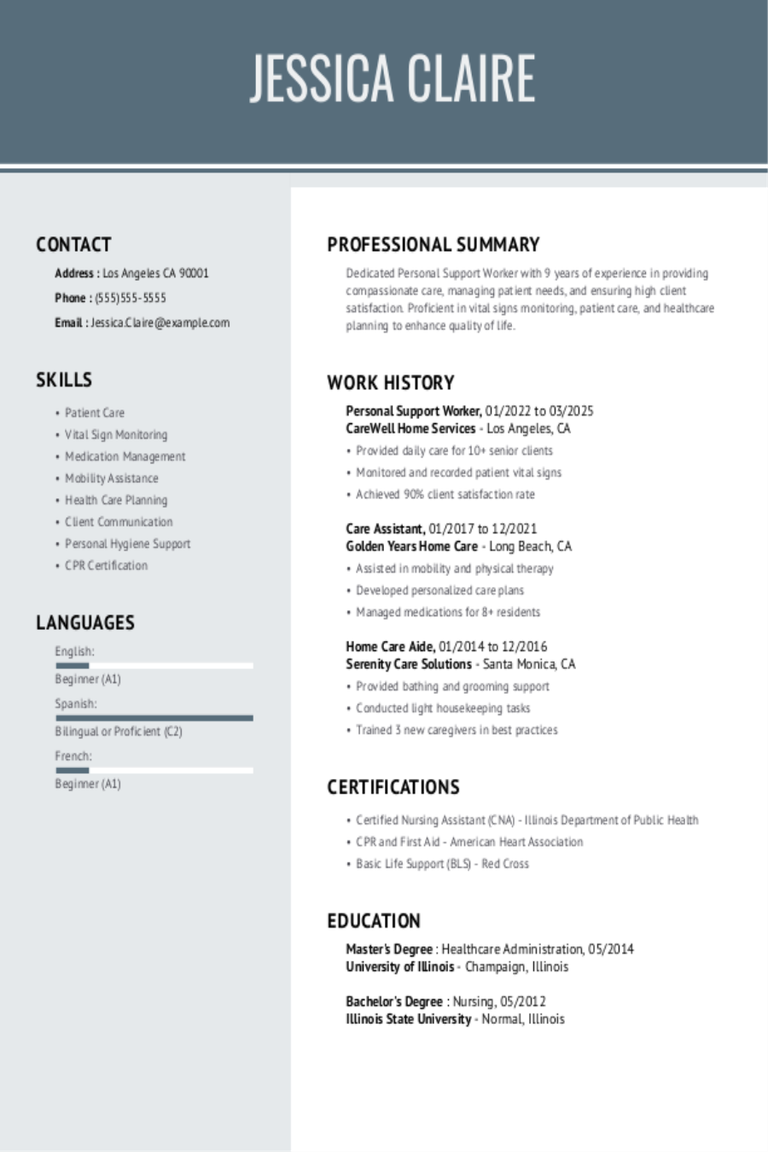
Personal Support Worker Resume Examples & Templates
Explore personal support worker resume examples to see how to highlight hands-on caregiving experience, certifications, and essential skills like compassion and reliability on your resume.Build my resumeImport existing resumeCustomize this
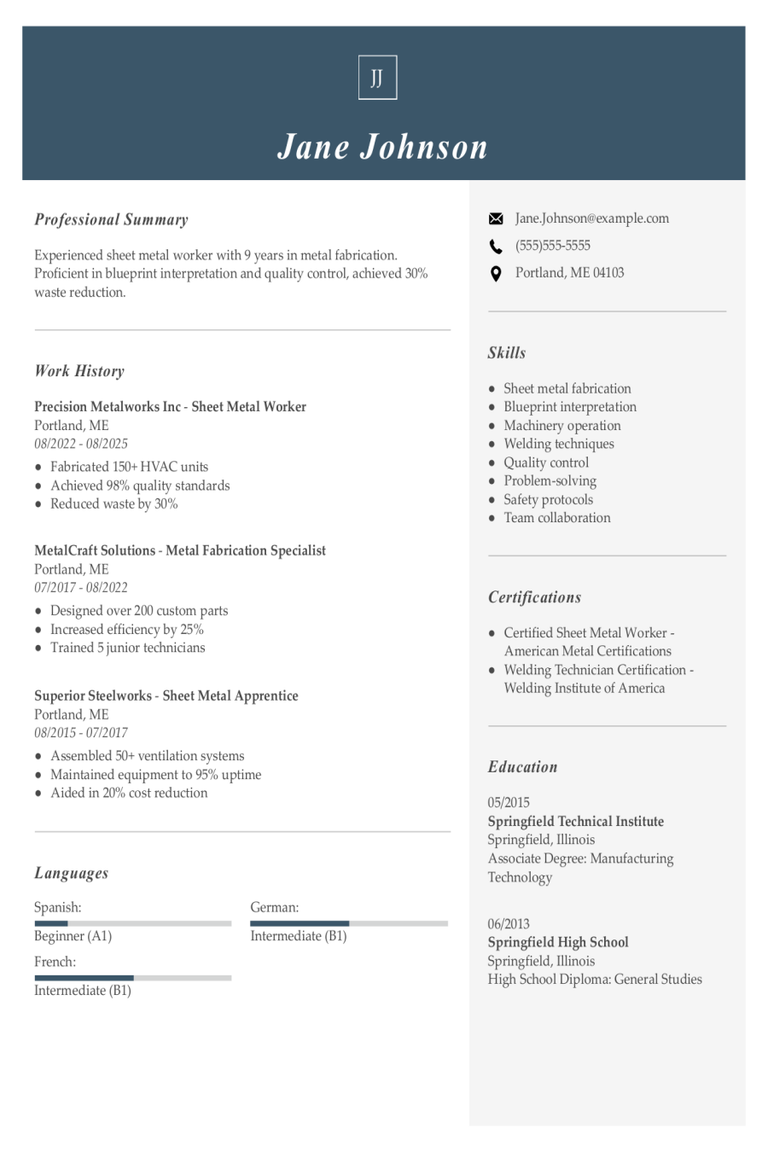
Sheet Metal Worker Resume Examples & Templates for 2025
Browse sheet metal worker resume examples and tips to learn how to highlight your hands-on experience and problem-solving abilities to stand out to recruiters and hiring managers.Build my resumeImport existing

Job Title Inflation: 92% of Workers Say Job Titles Are Used to Fake Career Growth
Job titles are supposed to signal achievement. However, for many employees, they’ve become nothing more than a brand. A new MyPerfectResume survey of 1,000 U.S. workers reveals that job titles are
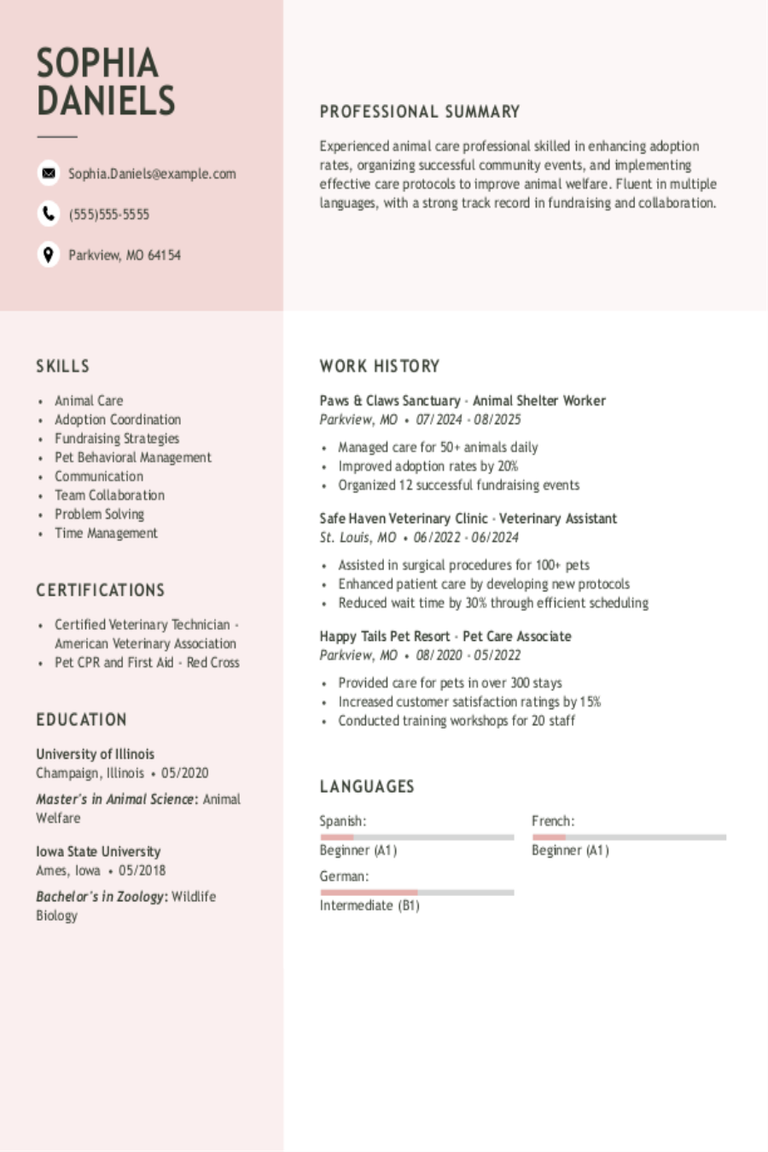
Animal Shelter Worker Resume Examples & Templates for 2025
Explore animal shelter worker resume examples to see how to highlight your experience caring for animals, maintaining facilities, and assisting with adoptions. These samples and tips help you highlight compassion,
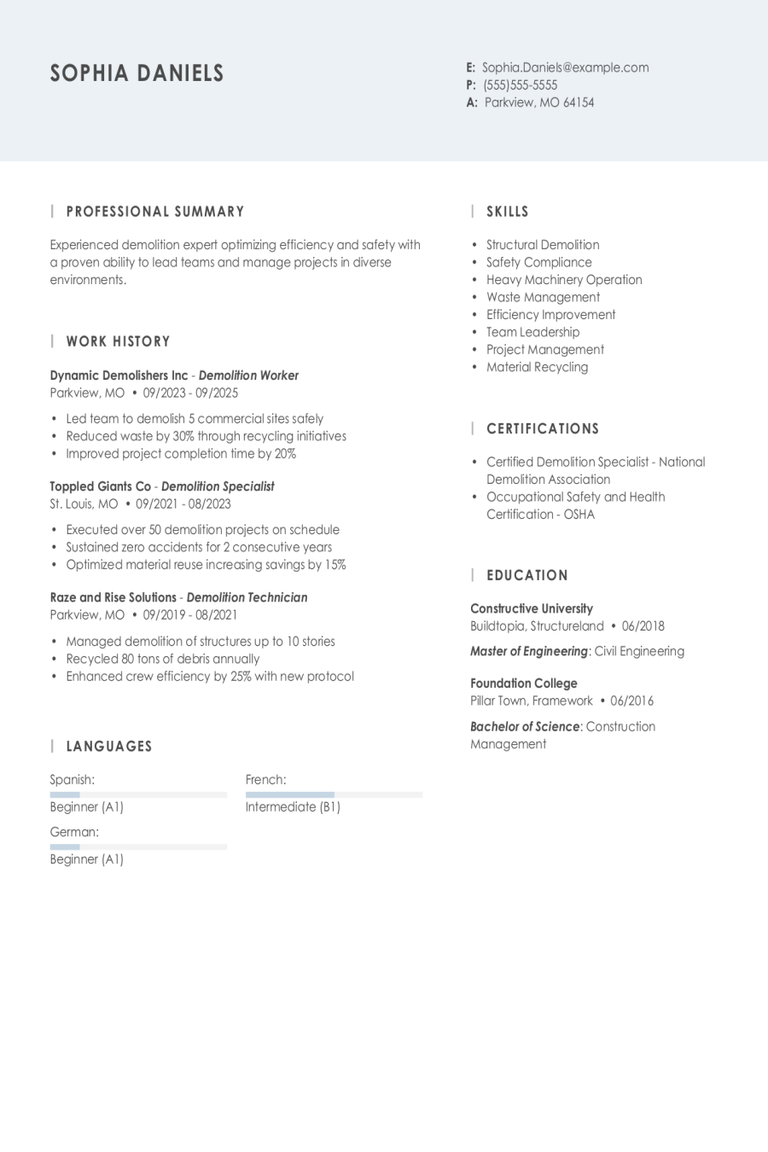
Demolition Worker Resume Examples & Templates for 2025
Discover demolition worker resume examples that highlight skills in safely tearing down structures and handling heavy equipment. Learn how to showcase your experience and catch the eye of construction employers

Ghost Growth: 65% of Workers Say Their Career Growth Is Just for Show
Career growth is supposed to feel empowering. But for millions of U.S. workers, it feels fake. A new MyPerfectResume survey of 1,000 currently employed adults reveals that most workers have experienced
